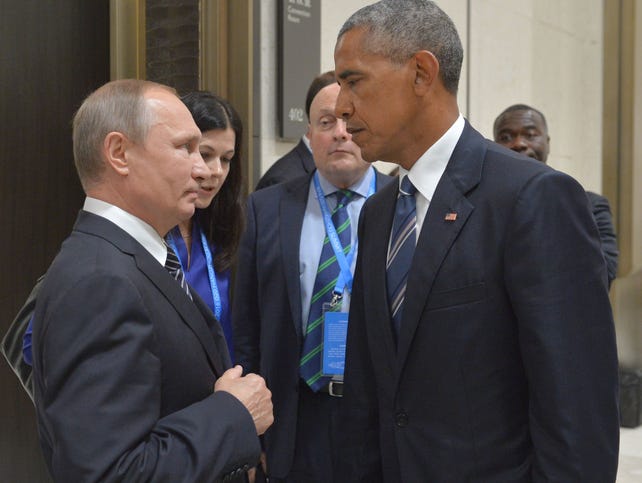
President Obama, angered by Russian hacking during the 2016 elections, authorized a covert cyber operation to deploy “implants” in Russian networks that could be triggered remotely in retaliation to any future cyber aggression by Moscow, The Washington Postreported Friday.
The Post said the operation, still in its early stages, had been signed off on by Obama and authorized U.S. agencies to carry out the program, even into the new administration.
“U.S. intelligence agencies do not need further approval from (President) Trump, and officials said that he would have to issue a countermanding order to stop it,” the Post reported. “The officials said that they have seen no indication that Trump has done so.”
The implants, developed by the NSA, are designed to hit Russian networks deemed “important to the adversary and that would cause them pain and discomfort if they were disrupted,” a former U.S. official told the Post.
They could be activated in the event that Russia attacked a U.S. power grid or interfered in a future U.S. presidential race.
The report is contained in a sweeping investigation into Russian electoral interference, U.S. efforts to uncover its extent, and the political handwringing over how and when to alert the public.
The lengthy report is based on interviews with more than three dozen current and former U.S. officials in senior positions in government, including at the White House, the State, Defense and Homeland Security departments, and U.S. intelligence services the newspaper said.
Other key findings:
— CIA Director John Brennan first alerted the White House in early August that Russian President Vladimir Putin had ordered an operation to defeat or at least damage Hillary Clinton and help elect her opponent, Donald Trump. Sent by courier from the CIA, it carried “eyes only” instructions that its contents be shown to just four people: Obama and three senior aides.
— As officials debated a response, secrecy and security was extraordinary, akin to the measures employed in the leadup to the killing of Osama bin Laden.
— On Aug. 15, Homeland Security secretary Jeh Johnson arranged a conference call with dozens of state officials, hoping to enlist their support for designating state voting system “critical infrastructure” to give priority in offering them federal cybersecurity assistance. He ran into a wall of resistance, including skepticism from Georgia’s secretary of state who said he was unconvinced of Russian interference and viewed the White House proposal an assault on state rights.
— Many White House officials were torn over how to make the information about Russian hacking public out of concern that it might appear to be a deliberate attempt by the White House to influence the election.
— One constant factor in discussions over how to respond was a belief that Hillary Clinton would win the presidency and there would be time to confront the Russians more directly after the election. One former senior Obama administration official, speaking on background, expressed remorse over how the government handled the Russian problem, saying, “I feel we sort of choked.”
— A Situation Room meeting to brief 12 key members of Congress, including the leadership of both parties, on the Russian hacking issue “devolved into a partisan squabble.” Democrats pressed to make the information public, while Republicans resisted, arguing that to warn the public that the election was under attack would bolster Russia’s aim of undermining confidence in the system.
—The Obama administration warned Russia three times over hacking, including a direct statement by Obama to Russian President Vladimir Putin during a meeting of world leaders in China. Putin responded by demanding proof and accusing the United States of interfering in Russia’s internal affairs.
The White House, the CIA, the FBI, the NSA and the Office of the Director of National Intelligence declined to comment on the newspaper’s findings, the Post said.
